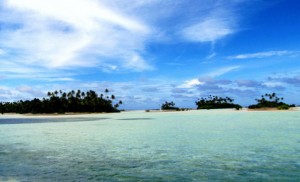A Pacific Islander is set to go to the High Court in New Zealand in his fight to be recognized as the world’s first climate change refugee.
With ocean’s predicted to rise by high 1 meter by the turn of the century, the future of Kiribati, one of the world’s lowest-lying nations, looks bleak. One man seeks to escape his island home by setting a legal precedent and is appealing to the courts to grant refugee-status to victims of climate change.
After the man’s two initial appeals to the New Zealand immigration authorities were refused, the Kiribati native has now turned to the High Court in his quest to be recognized as the world’s first climate change refugee.
The Kiribati native – who cannot be named due to New Zealand immigration laws – left the low-lying Pacific nation six years ago, swapping the idyllic but beleaguered beaches of his atoll for higher ground and better prospects in New Zealand.
Identified by climate change specialists as one of the most vulnerable countries in the world, rising sea levels are slowly but surely threatening to wipe the impoverished string of atolls from the map completely in only a matter of decades.
Describing a dramatic increase in so-called “king tides” (extreme high tides) within his immigration report, the Kiribati man goes on to tell how crops and homes are routinely destroyed by the force of the tides, with sea defenses easily breached and thousands of residents constantly at risk.
In 1998, the man’s village of origin repeatedly fell victim to the king tides; the barriers providing little resistance against the might of Mother Nature. Overcrowded and without a sewerage system, the village’s water system soon became contaminated, with sickness rife amongst the inhabitants.
According to the report, a return to the island would spell danger for the man and his family, with his three New Zealand-born children particularly vulnerable. “There’s no future for us when we go back to Kiribati,” he was quoted as saying. “Especially for my children. There’s nothing for us there.”
Whilst a positive decision could have huge implications for the residents of other low-lying islands, legal experts consider the case to be something of a long shot, particularly as the New Zealand Immigration and Protection Tribunal defines a refugee as someone who is being persecuted.
The man’s lawyer, Michael Kidd, has already promised to take the matter all the way to the Supreme Court should the New Zealand Immigration and Protection Tribunal still refuse to recognize climate change as a refugee-issue.
With the trial set to begin on the 16th October, all eyes will be on New Zealand’s High Court. Private Island News will keep you up to date with all the developments.



